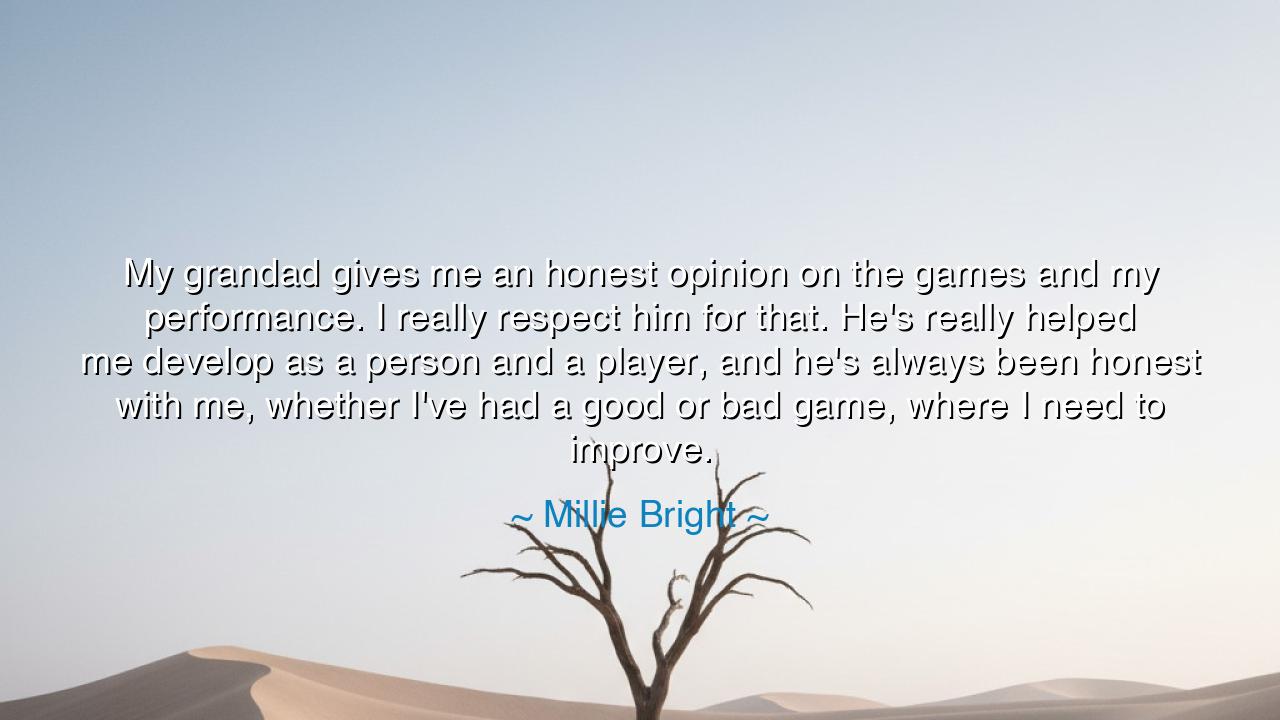
My grandad gives me an honest opinion on the games and my
My grandad gives me an honest opinion on the games and my performance. I really respect him for that. He's really helped me develop as a person and a player, and he's always been honest with me, whether I've had a good or bad game, where I need to improve.






"My grandad gives me an honest opinion on the games and my performance. I really respect him for that. He's really helped me develop as a person and a player, and he's always been honest with me, whether I've had a good or bad game, where I need to improve." In these words, Millie Bright expresses the powerful impact of honesty, mentorship, and constructive feedback in personal growth. The relationship she shares with her grandad is not merely one of affection, but of wisdom—a wisdom that comes from the candid and truthful assessments of her performance, helping her to become both a better athlete and a better person. Through this honest relationship, Bright highlights the deep importance of authenticity and self-improvement in our journey toward excellence.
In ancient cultures, the importance of honest counsel and mentorship was deeply ingrained. Consider the stories of the great philosophers of antiquity, such as Socrates and Aristotle, who did not merely teach their students through lectures but engaged them in rigorous dialogue. Socrates, with his Socratic method, would question his disciples, challenging them to examine their thoughts and actions deeply, often revealing uncomfortable truths about their beliefs and behaviors. Similarly, Aristotle emphasized the value of mentorship, teaching that the best way to develop as a person was through the guidance of someone who could offer honest, and sometimes unpleasant, feedback. In both cases, the mentor’s role was not to simply praise the student but to help them improve, even if it meant delivering difficult truths.
This form of mentorship—where honesty and constructive criticism play a central role—has been vital throughout history. Confucius, the ancient Chinese philosopher, also advocated for this type of guidance in his teachings. He believed that true education and personal growth could only occur when an individual was willing to accept honest feedback, even if it was harsh. In The Analects, Confucius often spoke of the importance of rectifying one’s behavior through reflection and the advice of trusted mentors. Just as Millie Bright values her grandad’s honest opinion, Confucius would argue that such guidance is necessary for the growth of both the individual and society as a whole.
In more recent history, Sir Alex Ferguson, one of the greatest football managers, famously fostered an environment of honest communication within his teams. Ferguson’s approach was not one of empty praise but of direct feedback. He demanded excellence from his players, not just through encouragement, but by challenging them to confront their weaknesses. Ferguson was known for having frank, sometimes uncomfortable, conversations with his players, pushing them to improve at every step. His success, both as a manager and a mentor, lay in his ability to honestly assess his players’ performances and guide them toward continuous improvement—just as Millie Bright’s grandad has done for her.
The impact of honest feedback on personal development cannot be overstated. Millie Bright’s gratitude towards her grandad reveals an essential truth about growth: it is not in the praise or applause that we find true improvement, but in the honest assessments of our performance. These assessments, when offered with care and respect, become the foundation upon which we can build our skills, refine our abilities, and become the best versions of ourselves. The same is true for any field—whether in sports, academics, or life in general—growth is nurtured through truthful guidance that points out where we are strong, where we are weak, and how we can continue to improve.
The lesson we take from Millie Bright’s words is one of humility, self-awareness, and the importance of honest feedback. Just as Bright listens to her grandad’s wisdom with respect and openness, we too must be willing to listen to the constructive criticism of those who care about our development. In our own lives, whether in work, relationships, or personal growth, we must seek out honesty, embrace it, and use it as a tool to become better. We must surround ourselves with those who are willing to be candid with us, who will help us see our blind spots and push us to reach new heights. Self-improvement is not a solitary endeavor; it is shaped by the voices of those around us who challenge us to do better.
In our daily lives, let us approach growth with the same humility and honesty that Millie Bright has embraced with her grandad’s guidance. Just as she has allowed his truthful advice to refine her as both a player and a person, so too must we seek out and cherish those who are willing to offer us real and honest insights. Let us remember that true growth is not found in comfort or praise but in reflection, correction, and the wisdom of those who help us become better. Whether in our personal or professional lives, may we always be open to the honest feedback that will lead us to our highest potential.






AAdministratorAdministrator
Welcome, honored guests. Please leave a comment, we will respond soon